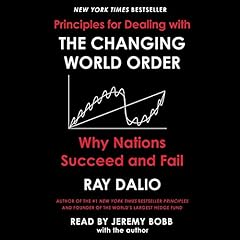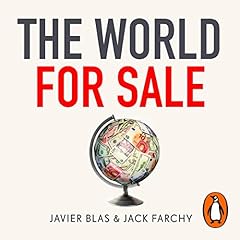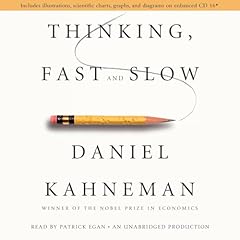Entdecke mehr mit dem kostenlosen Probemonat
Mit Angebot hören
-
Why Nations Fail
- The Origins of Power, Prosperity, and Poverty
- Gesprochen von: Dan Woren
- Spieldauer: 17 Std. und 55 Min.
Artikel konnten nicht hinzugefügt werden
Der Titel konnte nicht zum Warenkorb hinzugefügt werden.
Der Titel konnte nicht zum Merkzettel hinzugefügt werden.
„Von Wunschzettel entfernen“ fehlgeschlagen.
„Podcast folgen“ fehlgeschlagen
„Podcast nicht mehr folgen“ fehlgeschlagen
Für 36,95 € kaufen
Sie haben kein Standardzahlungsmittel hinterlegt
Es tut uns leid, das von Ihnen gewählte Produkt kann leider nicht mit dem gewählten Zahlungsmittel bestellt werden.
Inhaltsangabe
Brilliant and engagingly written, Why Nations Fail answers the question that has stumped the experts for centuries: Why are some nations rich and others poor, divided by wealth and poverty, health and sickness, food and famine?
Is it culture, the weather, geography? Perhaps ignorance of what the right policies are?
Simply, no. None of these factors is either definitive or destiny. Otherwise, how to explain why Botswana has become one of the fastest growing countries in the world, while other African nations, such as Zimbabwe, the Congo, and Sierra Leone, are mired in poverty and violence?
Daron Acemoglu and James Robinson conclusively show that it is man-made political and economic institutions that underlie economic success (or lack of it). Korea, to take just one of their fascinating examples, is a remarkably homogeneous nation, yet the people of North Korea are among the poorest on earth while their brothers and sisters in South Korea are among the richest. The south forged a society that created incentives, rewarded innovation, and allowed everyone to participate in economic opportunities. The economic success thus spurred was sustained because the government became accountable and responsive to citizens and the great mass of people. Sadly, the people of the north have endured decades of famine, political repression, and very different economic institutions - with no end in sight. The differences between the Koreas is due to the politics that created these completely different institutional trajectories.
Based on 15 years of original research Acemoglu and Robinson marshall extraordinary historical evidence from the Roman Empire, the Mayan city-states, medieval Venice, the Soviet Union, Latin America, England, Europe, the United States, and Africa to build a new theory of political economy with great relevance for the big questions of today, including:
- China has built an authoritarian growth machine. Will it continue to grow at such high speed and overwhelm the West?
- Are America’s best days behind it? Are we moving from a virtuous circle in which efforts by elites to aggrandize power are resisted to a vicious one that enriches and empowers a small minority?
- What is the most effective way to help move billions of people from the rut of poverty to prosperity? More philanthropy from the wealthy nations of the West? Or learning the hard-won lessons of Acemoglu and Robinson’s breakthrough ideas on the interplay between inclusive political and economic institutions?
Why Nations Fail will change the way you look at—and understand—the world.
PLEASE NOTE: When you purchase this title, the accompanying reference material will be available in your My Library section along with the audio.
Kritikerstimmen
"Why Nations Fail is a truly awesome book. Acemoglu and Robinson tackle one of the most important problems in the social sciences - a question that has bedeviled leading thinkers for centuries - and offer an answer that is brilliant in its simplicity and power. A wonderfully readable mix of history, political science, and economics, this book will change the way we think about economic development. Why Nations Fail is a must-read book." (Steven Levitt, co-author of Freakonomics)
Das sagen andere Hörer zu Why Nations Fail
Nur Nutzer, die den Titel gehört haben, können Rezensionen abgeben.Rezensionen - mit Klick auf einen der beiden Reiter können Sie die Quelle der Rezensionen bestimmen.
-
Gesamt4 out of 5 stars
-
Sprecher5 out of 5 stars
-
Geschichte4 out of 5 stars
- Agrail
- 04.07.2024
Great explanation and backgrounds
I find the title a bit misleading. I expected to hear an audiobook that focus on failed nations but it was more about the reasons why some countries are rich and others poor - but still very educative and interesting!
Ein Fehler ist aufgetreten. Bitte versuche es in ein paar Minuten noch einmal.
Sie haben diese Rezension bewertet.
Wir haben Ihre Meldung erhalten und werden die Rezension prüfen.
-
Gesamt5 out of 5 stars
-
Sprecher5 out of 5 stars
-
Geschichte5 out of 5 stars
- RM
- 11.03.2017
Perfect explanation of the world's current different welfare
Really interesting.
It shows very impressive why it is worth to fight for inclusive political and economic institutions. Furthermore it states clearly that political and economic institutions can't stay inclusive if one side isn't inclusive.
Ein Fehler ist aufgetreten. Bitte versuche es in ein paar Minuten noch einmal.
Sie haben diese Rezension bewertet.
Wir haben Ihre Meldung erhalten und werden die Rezension prüfen.
-
Gesamt5 out of 5 stars
-
Sprecher5 out of 5 stars
-
Geschichte5 out of 5 stars
- AHashem
- 14.04.2020
Politics and history
Amazing politics-history mix
This is my first book about politics, and I love it
Ein Fehler ist aufgetreten. Bitte versuche es in ein paar Minuten noch einmal.
Sie haben diese Rezension bewertet.
Wir haben Ihre Meldung erhalten und werden die Rezension prüfen.
-
Gesamt5 out of 5 stars
-
Sprecher5 out of 5 stars
-
Geschichte5 out of 5 stars
- Philbert
- 29.06.2021
just great
this book answered a lot of big questions that kept bugging me for a long time!
Ein Fehler ist aufgetreten. Bitte versuche es in ein paar Minuten noch einmal.
Sie haben diese Rezension bewertet.
Wir haben Ihre Meldung erhalten und werden die Rezension prüfen.
-
Gesamt5 out of 5 stars
-
Sprecher5 out of 5 stars
-
Geschichte5 out of 5 stars
- Wildwasser
- 04.06.2015
Hochinformativ und spannend
Wer einerseits Interesse an Geschichte, hat und andererseits an Politik ist bei diesem Hörbuch richtig. Es versucht ein Erklärungsmodell für die rational gesehen heutzutage fast unerklärliche Ungleichheit und Ungerechtigkeit und bitterste Armut in der Welt zu finden. Nicht jeder wird dem Autor in allem zustimmen aber hochkomplexe Zusammenhänge werden definitiv hochspannend analysiert.
Schockierend ist, in welch hohem Ausmaß Staaten von Verbrechern und verbrecherischen Gruppierungen regiert wurden und werden, die für den eigenen Profit über Leichen gehen.
Schade ist, dass das Buch keine Analyse der Entwicklung in Deutschland bietet.
Hat sich sehr gelohnt.
Ein Fehler ist aufgetreten. Bitte versuche es in ein paar Minuten noch einmal.
Sie haben diese Rezension bewertet.
Wir haben Ihre Meldung erhalten und werden die Rezension prüfen.
3 Leute fanden das hilfreich
-
Gesamt5 out of 5 stars
-
Sprecher5 out of 5 stars
-
Geschichte5 out of 5 stars
- Autor
- 20.08.2019
A new theory on economy, inequality and policy
This book provides profound analysis on the interrelationships between pluralism and economic outcome thruout history.
Ein Fehler ist aufgetreten. Bitte versuche es in ein paar Minuten noch einmal.
Sie haben diese Rezension bewertet.
Wir haben Ihre Meldung erhalten und werden die Rezension prüfen.
-
Gesamt4 out of 5 stars
-
Sprecher4 out of 5 stars
-
Geschichte4 out of 5 stars
- Henrik
- 06.12.2023
Inclusive or extracting political institutions
I hope, I’ll never hear the words “inclusive” or “extracting” political institutions, as this was how all the nations of the world and of history were interpreted to be either a success or a failure. The explanation was hammered out repeatedly ad nausea. The terms are probably legit and reasonable, but I also feel that they were burdened with to much explanatory power. It made me think of the Halo Effect, meaning if a nation has success, they have inclusive institutions, failure means extractive - the conclusion is almost written upfront. Any disconfirming evidence isn’t even a possibility, as what they write is almost definitional. Their framework and explanation seemed monotonic and monocausal. Yet, I’ll praise the book for the breadth of their exposition, their many examples. The cases with nations, I already knew, were to my knowledge pretty accurate, so it gave credence to their many other cases.
Ein Fehler ist aufgetreten. Bitte versuche es in ein paar Minuten noch einmal.
Sie haben diese Rezension bewertet.
Wir haben Ihre Meldung erhalten und werden die Rezension prüfen.
-
Gesamt4 out of 5 stars
-
Sprecher5 out of 5 stars
-
Geschichte5 out of 5 stars
- Manuel O
- 14.09.2022
Etwas repetitiv aber definitiv hörenswert!
Viele historische Beispiele, gute Theorien, schöne Zusammenfassung, guter Sprecher, definitiv ein Hörbuch, dass ich empfehlen würde
Ein Fehler ist aufgetreten. Bitte versuche es in ein paar Minuten noch einmal.
Sie haben diese Rezension bewertet.
Wir haben Ihre Meldung erhalten und werden die Rezension prüfen.
-
Gesamt4 out of 5 stars
-
Sprecher4 out of 5 stars
-
Geschichte4 out of 5 stars
- Marc Dierckx
- 03.09.2015
Creative destruction of nations.
Allowing individuals to take their own destiny in their hands and giving them the power to pursue allong the chosen path is the recipy for success. This is the basic thesis of the book and as such an "en vogue" book , let it be said with much more details, with more case studies and in a clear and consise language. A must to readers that are not yet familiar with these theories.
The title "why nations fail" however also express the shortcoming of the book. The obvious question: why nations only can fail and are not subject to creative destruction is never asked. For a five star rating I would have prefered a book with title "creative distruction of nations: a solution to poverty?".
Ein Fehler ist aufgetreten. Bitte versuche es in ein paar Minuten noch einmal.
Sie haben diese Rezension bewertet.
Wir haben Ihre Meldung erhalten und werden die Rezension prüfen.
1 Person fand das hilfreich
-
Gesamt5 out of 5 stars
-
Sprecher5 out of 5 stars
-
Geschichte5 out of 5 stars
- Ms. V. Fo
- 13.02.2022
Amazing read
Loved this! Very insightful, connected narrative with excellent examples of history in various nations around the globe. My only comment is why this book is not available in Lithuanian
Ein Fehler ist aufgetreten. Bitte versuche es in ein paar Minuten noch einmal.
Sie haben diese Rezension bewertet.
Wir haben Ihre Meldung erhalten und werden die Rezension prüfen.





















